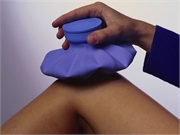- Are You Making This Expensive Thermostat Error This Winter?
- Recognizing the Signs of Hypothyroidism
- 10 Strategies to Overcome Insomnia
- Could Artificial Sweeteners Be Aging the Brain Faster?
- Techniques for Soothing Your Nervous System
- Does the Water in Your House Smell Funny? Here’s Why
- Can a Daily Dose of Apple Cider Vinegar Actually Aid Weight Loss?
- 6 Health Beverages That Can Actually Spike Your Blood Sugar
- Treatment Options for Social Anxiety Disorder
- Understanding the Connection Between Anxiety and Depression
Most Knee Cracking Is Normal, Expert Says

If your knees crack when you walk or run, don’t be too worried, an expert says.
“Knee cracking could mean lots of things,” said Harshvardhan Singh, assistant professor in the department of physical therapy at the University of Alabama at Birmingham. “If it is painful, then you should see a health care provider.”
The cause can be a large kneecap that doesn’t fit well into the groove, producing cracking during activities such as running and jogging.
And if the thigh muscle is too tight, it can pull the kneecap, causing an audible crack. Degeneration of knee cartilage can, too.
“The degenerative changes can also lead to pain and/or locking of the knee joint,” Singh said in a university news release. “Typically, degenerative changes are common in older people.”
Scans have shown that the displacement of joint surfaces forming the knee can cause a chain reaction in which natural gas bubbles collapse. The result: knee cracking.
“You should not be worried if your knees crack often as long as it is not associated with pain,” Singh said.
If you have had a recent trauma to the knee and it starts to crack, you should see a doctor even in there’s no pain, he said.
“Do not allow these sounds to make you feel abnormal or mentally stressed, or limit your functional activities,” Singh said. “A knee crack by itself does not indicate presence of any disease.”
It’s normal for knees to crack when you are active and it does not mean you have arthritis, he explained.
“Interestingly, in knee arthritis, knee joint becomes hypomobile and loses its movement to a certain degree, which may lead to no knee crack,” he said. “A knee crack may mean your joint is mobile and lubricated.”
A professional may be able to help quell the cracking, Singh said.
“A physical therapist may be able to help you determine if there are specific movement patterns or any biomechanical alignment which may be leading to knee crack and prescribe you certain exercises to help improve it,” he said.
More information
For more about cracking knees, visit Johns Hopkins University.
Source: HealthDay
Copyright © 2026 HealthDay. All rights reserved.










